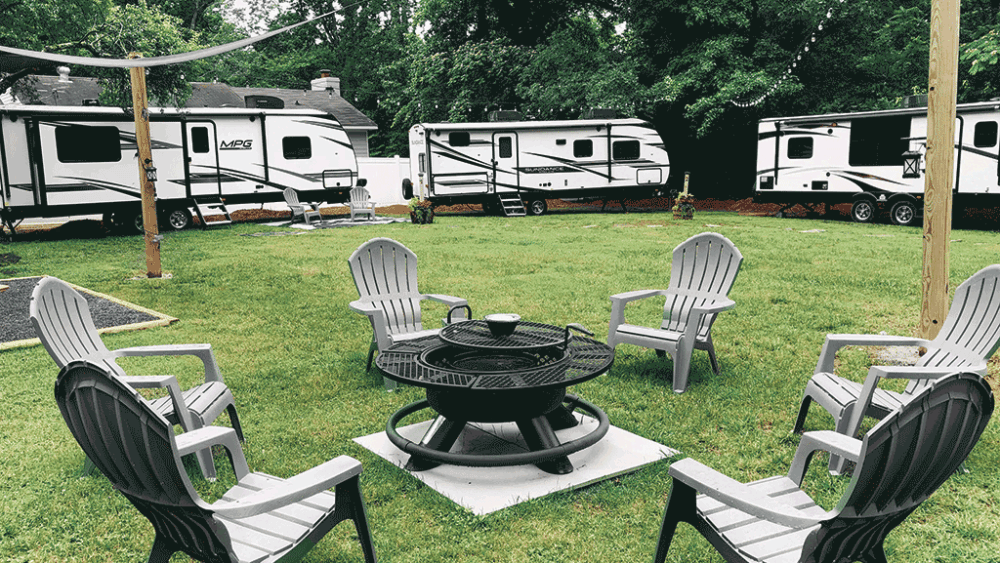After developer Bruce Etkin, a past ULI Trustee and a current member of the ULI Foundation Board, sold all of his company’s properties in 2021, he channeled his energy and attention to different challenges—one of them homelessness.
A longtime supporter of ULI initiatives such as the Etkin Scholars Program, Etkin asked ULI’s Homeless to Housed program to connect him to ULI homelessness experts and met Phil Payne, ULI Charlotte chair and co-founder of The Lotus Campaign, a homelessness solutions nonprofit. With Etkin’s support, The Lotus Campaign is embarking on a series of reports exploring nontraditional, rapidly deployable housing solutions in response to the ongoing humanitarian and economic crisis of homelessness across the United States that now affects more than 600,000 people on any given night.
The first report focuses on the possibility of using single-axle travel trailers as a homelessness solution. A deeply affordable option, the trailer communities that Etkin envisions, replete with supportive services and property management, have already been piloted in Texas and North Carolina. Yet obstacles remain: travel trailers are not considered permanent housing by HUD. By law, travel trailers need to be moved every 30 days, and local communities cannot change the code on that. But as local emergency declarations become more common because of homelessness, regulations may change to pilot bold ideas at speed.
Urban Land: What do you see as the role of ULI and the commercial real estate industry in addressing homelessness? And why do you think ULI is particularly well positioned to champion this cause?
Urban Land Institute brings together a great wealth of knowledge—government officials, city planners, civil engineers, developers, bankers, and lawyers—to look at urban problems. Homelessness has now become a core issue in so many cities, and these leaders have deep experience in the challenges posed by this issue, as well as in finding creative solutions. ULI has published case studies that show it can cost up to $1 million dollars in California to build a unit of housing for the homeless in the conventional way. With [ULI’s Homeless to Housed Initiative], we are studying cost-effective and rapidly deployable solutions to housing for those experiencing homelessness. This includes quick-build, temporary, one-story buildings and other innovative structures.
UL: You are collaborating with the Lotus Campaign on a report about one of these one-story solutions: single-axle travel trailers. Share how this project began and has evolved.
I attended a presentation by former ULI President Randy Rowe about the sharing economy—Uber and VRBO, for example—when I started thinking: How can we apply the sharing economy to the issue of homelessness? Why don’t we form a nonprofit that is a VRBO-type model, but it matches people that have extra space in their house with homeless people? Hosts would offer housing in exchange for household or business support, such as pet care, janitorial work, gardening, property maintenance, housekeeping, or caretaking. A national nonprofit dedicated to addressing homelessness could be formed to offer this opportunity to a subset of its clients who have passed background checks and are deemed to be low risk for a community placement
I asked Phil Payne of the Lotus Campaign to explore the feasibility of this concept. When the Campaign began to reach out to individuals with a survey on the idea, they found that very few people were comfortable with the idea of having a homeless person in their residence, even those who were deemed to be low risk—estimated to be about 10 percent of the homeless population, or 60,000 people. I began to think about other viable [ways] to create efficient, affordable options for communities to address homelessness—particularly with this same 10 percent of the population deemed low risk. While at Burning Man and staying in a travel trailer, I realized these travel trailers could be a solution.
UL: How could single-axle travel trailers be a good homelessness solution?
Each travel trailer comes with a queen-sized bedroom ... a queen bed, a kitchen, and a dinette, a living area with TV, and a bathroom. It even has extra room for a double bunk bed, if you have kids. You can buy a brand-new travel trailer for less than $40,000. In addition, they’re truly portable, easily connected to electricity, and have their own sewage and water storage. They can be serviced with a [portable-toilet] truck for sewage and a water truck for water. This is the lowest-cost housing available, and it’s the easiest housing solution to provide and to take care of.
UL: How would you pilot this?
We’d [like to build] prototype villages designed with 100 individual housing units, including a trailer for the resident manager, as well as trailers to be used for social services, medical care, and a community center. Perhaps if we made a large order of trailers, we could customize the trailers’ colors and adjust the shape a bit to look more architectural rather than aerodynamic. The communities would be gated, with landscaping, and residents would have finger keypads to get into the gated area and their individual units. Early, very rough estimates indicate that this model—including the on-site manager and contracting of social services—would cost approximately $50,000 per unit. This would include weekly water and sewage service, as well as electricity from a central hookup and internet.
UL: Why might travel trailers be a good fit for property owners?
Property owners can lease the land—they don’t have to permanently sell the land—to be used for travel trailers. My first thought was to get an Amazon-type facility or another national user of big warehouse space where you could put trailers in their parking lot. A community could be established with a five-year land lease—enabling neighbors to have regular input on how the trailer community is being managed. The property owner could provide housing for employees with proper zoning approval but [with] no need for building permits, as there is no need for underground utilities.
UL: What are the obstacles to this approach?
HUD does not recognize travel trailers as permanent housing, and trailers do not qualify for HUD assistance or other federal housing programs that are available to cities. As a result, efforts to move individuals from an unsheltered to sheltered status could not include travel trailers—[though] they meet FEMA’s guidelines for shelter in emergency situations. The next step is to encourage HUD to change ... guidelines to allow travel trailers as permanent housing, subject to inspections or other requirements, such as requiring the trailers to be less than 20 years old and inspected every three to five years to maintain manufacturer standards. FEMA already uses these exact same trailers to house people for years at a time.
UL: How can people who are interested in this concept get involved?
We are going to share the report on single-axle travel trailers to educate the ULI community. We hope that someone reads the report and knows of a piece of property where this concept would work, and that local community leaders who don’t want to spend so much money on building housing for the homeless will feel like this is a good solution. With ULI’s coalition, we could get the [HUD regulations] changed and, with a shake of an executive pen, be on the way to providing housing for thousands of people.






